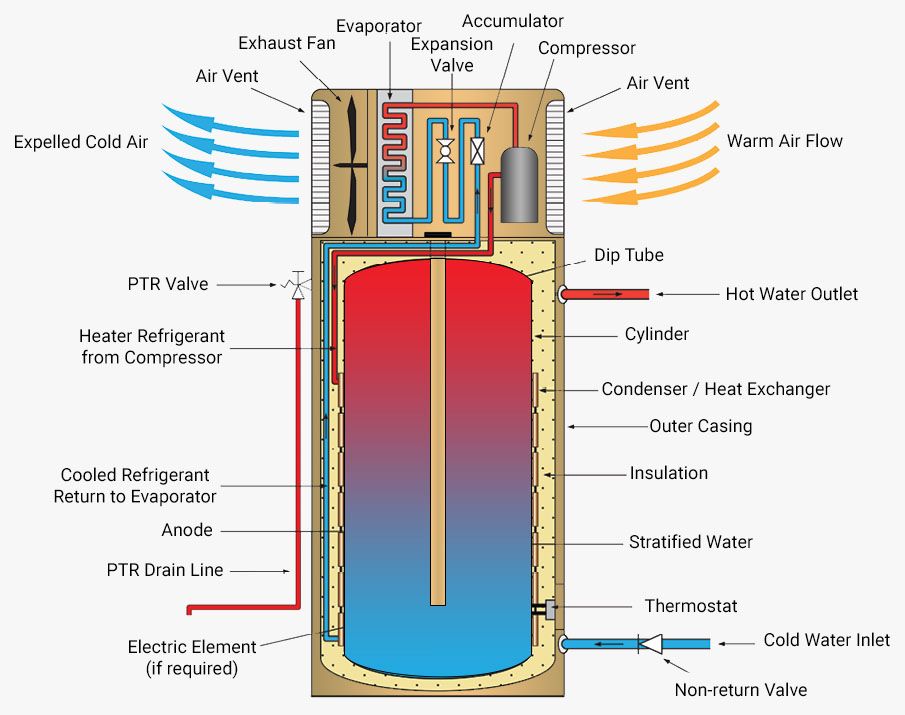Heat pump hot water systems explained
![[object Object]](https://uploads.prod01.sydney.platformos.com/instances/178/assets/images/_blog/how-does-a-heat-pump-hot-water-system-work.jpg)
You may have seen a heat pump system before or even used one at some point. Chances are that when you hear the term heat pump hot water system you are left scratching your head as it isn't something that you've heard of before. These revolutionary hot water systems are becoming more and more popular as they save both money and the environment.
How does a heat pump system work?
A heat pump works in the same way as a reverse-cycle air conditioner. Instead of heating the room, it heats the water.
So without much ado, here are the simple steps on how a heat pump works:
- Heat pump systems work by moving heat from the air in the room to water in the tank.
- The fan draws the air onto fins called an evaporator.
- The heat in the air is absorbed by a refrigerant which flows through the evaporator.
- The refrigerant is then compressed into a vapour which raises the temperature and pressure.
- The hot vapour then flows through the heat exchanger which heats the water and cools the refrigerant.
- Once the vapoured refrigerant has given all of its heat it then transforms into its liquid state and is cycled up to start again at the evaporator.
Types of heat pump systems
There are two types of heat pump systems - split systems and integrated systems.
- Split System - The evaporator, fan and compressor are separate and connected to the tank through refrigerant piping.
- Integrated Systems - In an integrated system, the entire system is connected ( tank, compressor) and comes as a single unit.
Inside diagram of a heat pump water heater

Video explanation of how a heat pump water heater works
Rheem Heat Pump
For more information, you can visit rheem.com.au.
Dux Heat Pump
More information can be found on dux.com.au.
Pros and cons of heat pump water heaters
Pros
- Lower running costs
- Less maintenance
- Provide cooling during summer
- Long life span (+50 years)
- Government rebates
Cons
- Higher upfront costs
- Can be difficult to install
- Extreme cold weather can damage the system
- Not entirely carbon neutral
- The rebate only covers the cost of the unit
table information source: greenmatch
Pros of heat pumps explained
Lower Running Costs
Heat pumps are generally cheaper to run than other types of hot water systems. Due to being cheaper to run you can typically expect to save around >$1600 per year.
Less Maintenance
Heat pumps will require less maintenance than traditional hot water systems. A professional heat pump installer needs to check your system every 3 to 5 years.
Cooling During Summer
Heat pumps are able to be put in reverse thus acting like an air conditioning unit. Air-to-air heat pumps can be easily switched to cool during summer.
Long Life Span
Heat pumps have a life expectancy of up to +50 years. However, the average lifespan has been between 14 - 15 years.
Government Rebate
The Government has offered rebates with renewable power incentives (solar, wind and hydro) find out more here.
Cons of heat pump hot water explained
Higher Upfront Costs
Heat pump systems have a larger upfront cost than other systems. Although their operating costs will end up paying themselves off sooner than other systems.
Difficult To Install
You can't just install a heat pump anywhere. There needs to be some research to find the best location for your system to be able to perform it is best.
Weather Damage
Heat pumps aren't designed to be used in cold weather, prolonged exposure can ultimately damage the system causing it not to perform efficiently.
Not Fully Carbon Neutral
Heat pumps still require electricity to operate which means that they will never be completely carbon-neutral. Unless a solar equivalent is produced.
Government Rebate Only Covers System
There is no definitive answer on how much you will get back in your rebate all that is known is that it only covers the cost of the unit itself, not the installation.
How to choose a heat pump water heater?
The initial cost can be more than the traditional storage hot water heaters. Their low running costs can offset the high initial investment.
Consider a few things before you buy a heat pump system:
- Hot water requirements
- Family size
- Size of the hot water system
- The energy efficiency of the system
- Annual operating and maintenance costs
Is a heat pump system worth it?
Absolutely. A heat pump system can help you save money on energy bills. They can be installed in areas with varying climate conditions.
They can work in cold weather conditions with the help of a booster. They are environmentally friendly options compared to electric hot water systems and can help you reduce your carbon footprint.
Everyday Plumbing - Your local hot water specialists
If you have any questions on hot water systems or you are unsure about any of the information that you have read in this post, feel free to get in touch either by calling on 0488 801 008 or by filling in our online contact form.
